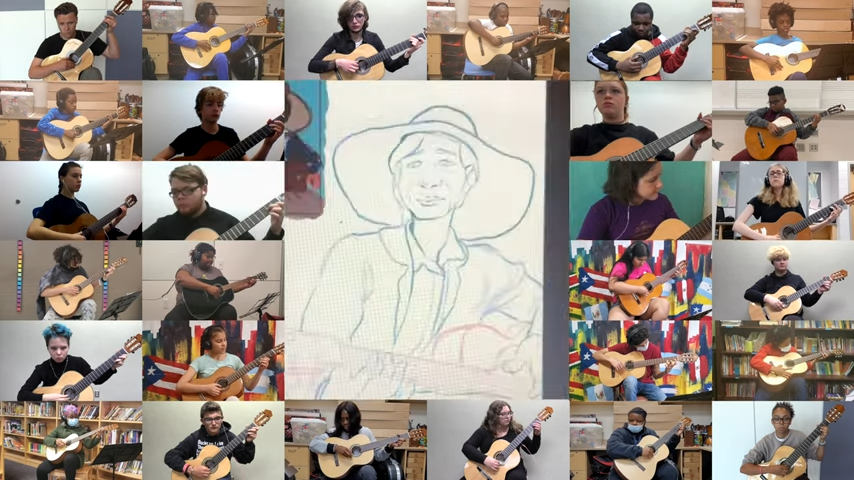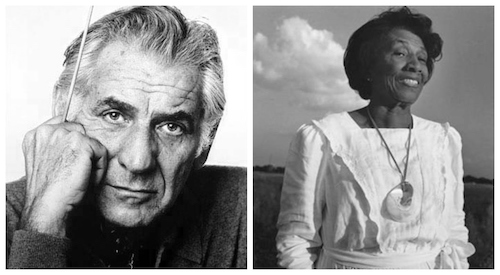by Jarrett Hoffman

•Tonight’s schedule: a Cleveland Orchestra send-off concert, and an Arts & Culture Network Night
•New video: the All-Ohio Virtual Guitar Orchestra (pictured) makes its debut
•A feature on Native composers, including the experimental writing of Raven Chacon, and Jerod Impichchaachaaha’ Tate’s impressionistic approach to referencing tribal music
•Almanac: Leonard Bernstein (in the words of his daughter Jamie Bernstein), and Undine Smith Moore, the “Dean of Black Women Composers”
HAPPENING TODAY:
At 7:30 pm, The Cleveland Orchestra gives the first of two send-off concerts before embarking on a three-week tour of Europe. This evening’s program at Mandel Hall includes Wolfgang Rihm’s Verwandlung II & III and Bruckner’s Symphony No. 9. (Tomorrow’s program swaps out those works for music by Richard Strauss and Alban Berg.) Get your tickets here.
Not so much a concert, but another event of interest on the calendar today is a free Arts & Culture Network Night at the LGBT Center in Gordon Square from 6-8 pm, hosted by Neighborhood Connections and Cuyahoga Arts & Culture. It’s aimed at artists, art supporters, and anyone who works at an arts-related organization, and there will be a performance by flamenco dancer Alice Blumenthal, founder of Northeast Ohio-based dance company ABREPASO. Register here.
NEW CONCERT VIDEO:
Last week brought the debut of the All-Ohio Virtual Guitar Orchestra — an ensemble made up of 50 musicians in grades 5-12, including students at the Cleveland Classical Guitar Society and at the guitar programs of McKinley High School and Plain Local Schools. The four-minute video, which premiered on YouTube on Friday, features William G. Tomer’s God Be With You Till We Meet Again in an arrangement inspired by folk/blues musician Elizabeth “Libba” Cotten. Click here to watch the performance, which also includes artwork by Guitar Society alumna Kadirah McJunkins.
A FEATURE ON NATIVE COMPOSERS:
An article in The New York Times showcases Native composers who are making waves in experimental music. Those include 2022 Pulitzer Prize winner Raven Chacon, who is both the first Native American and the first harsh noise musician to receive that honor. Read Grayson Haver Currin’s piece “Upending Expectations for Indigenous Music, Noisily” here.
Another Indigenous American composer in the news is Jerod Impichchaachaaha’ Tate, who is profiled in I Care If You Listen. Among the topics explored in the article is the “impressionistic route” that Tate follows in referencing tribal music. Click here to read Esteban Meneses’ “Jerod Impichchaachaaha’ Tate Embodies the Spirit of the Chickasaw Nation.” You can also revisit our 2021 interview with Tate here, when we discussed his story as a composer and his relationship to his alma mater CIM.
TODAY’S ALMANAC:
Who better to honor Leonard Bernstein on the anniversary of his birth (he would be 104 today) than one of his own children? In 2018, I had the opportunity to interview his daughter — author, narrator, and filmmaker Jamie Bernstein — who was bringing her program “Late Night with Leonard Bernstein” to the Cleveland Museum of Art.
To describe her dad, she used a word that didn’t exist in his time. “He was so broadband,” she told me. “He wasn’t just a conductor, he was a composer. And as a composer he was always pulling down the walls between genres and mixing things up in a new way. His legacy as an educator is astonishing, and hasn’t been duplicated by anyone.”
In addition to those areas, and his talents at the piano, he was also an activist and humanitarian. “He was never afraid to stand up and speak out against injustice and violence, and that has certainly lost none of its relevance.” Jamie pointed to the modern idea of the citizen-artist. “That wasn’t a ‘thing’ back when my dad was doing it — in a way he was the granddaddy of citizen-artists. He’s a role model for artists today who want to make their work part of the world.”
YouTube is full of material to celebrate Bernstein, but here’s a clip that Daniel Hathaway plucked from the internet in a previous Diary that gives insight into Bernstein’s warm and exciting personality as an educator. Click here to watch him rehearse Stravinsky’s The Rite of Spring during the 1987 International Conductor’s Competition and Master Course at the Schleswig-Holstein Festival in Germany.
We’ll close today’s almanac with Undine Smith Moore, who was born on this date in 1904 in Jarratt, Virginia, and who has become known as the “Dean of Black Women Composers.”
Vocal music was her preferred genre, including 50 choral works. Her 1981 oratorio Scenes from the Life of a Martyr, based on the life of Martin Luther King, Jr., was nominated for a Pulitzer Prize. Listen here to an excerpt performed by the Detroit Symphony.
Like Bernstein, education and activism are important elements of Moore’s legacy. In the first category, she taught piano, organ, and music theory at Virginia State College (now University) for over four decades, beginning at age 23. A champion of music by Black composers, three years before her retirement she co-founded the Black Music Center at Virginia State, aiming to spread awareness of the “contributions of black people to the music of the United States and the world.”
Moore was outspoken about the Civil Rights Movement and about racism. On that note, we’ll end with a poignant quote from her as she looked back on her career:
One of the most evil effects of racism in my time was the limits it placed upon the aspirations of blacks, so that though I have been ‘making up’ and creating music all my life, in my childhood or even in college I would not have thought of calling myself a composer or aspiring to be one.



